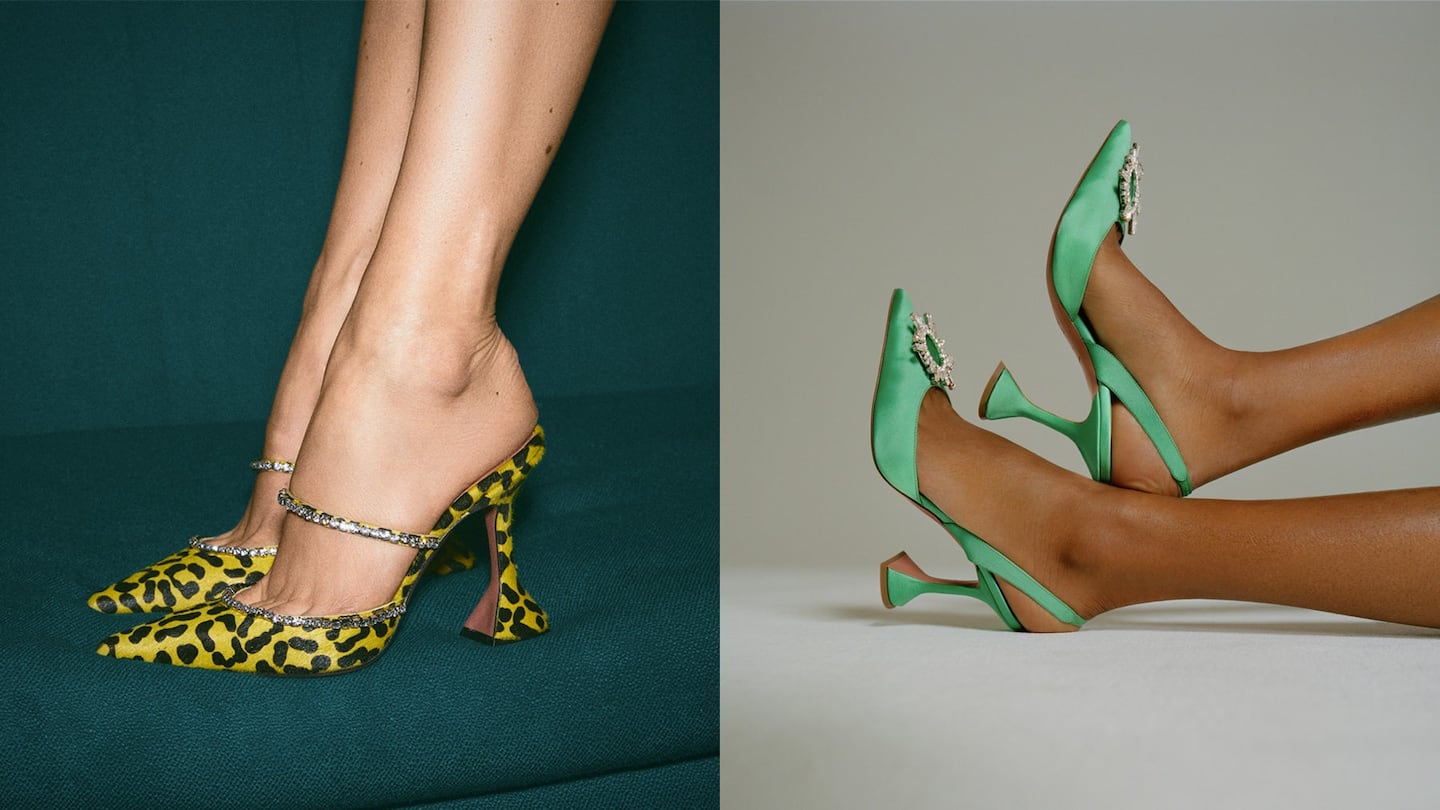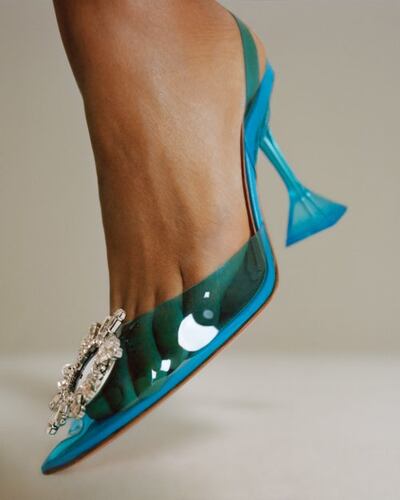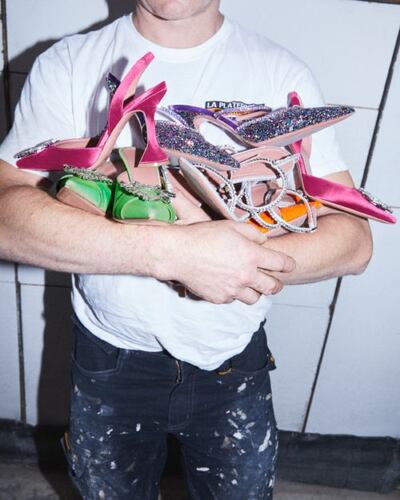
The Business of Fashion
Agenda-setting intelligence, analysis and advice for the global fashion community.

Agenda-setting intelligence, analysis and advice for the global fashion community.

PARIS, France — Amina Muaddi’s capsule collection for MyTheresa dropped online at the end of March, just as lockdowns had confined people across Europe and the US to their homes indefinitely.
Yet, shoppers still scrambled to get their hands on the Paris-based designer’s pricey hot pink, sling-back pumps and crystal-embellished sandals with her signature kick-flare heel. Within hours of the 10-piece collection dropping, most styles had already sold out.
Shoes like Muaddi’s are objectively a tough sell right now: glitzy heels and expensive party dresses are geared towards a lifestyle that is off the table for the foreseeable future thanks to the coronavirus pandemic. Even as lockdowns begin to ease, there will be few occasions to wear them. After all, chi-chi restaurants will continue to offer takeout options in lieu of in-house dining, while nightclubs and bars will remain closed until further notice.
Despite this, Muaddi's shoes are continuing to sell through at luxury retailers from Browns to Matchesfashion. Thanks to social media-driven buzz and a tight distribution, Muaddi has managed to maintain the hype surrounding her label, even as the pandemic has devastated some of her peers. Unlike many other small independent labels that also rely on the wholesale model, the designer didn't have orders cancelled, even though prices for her kick-flared heels range from €495 ($552) to €1,200 ($1,341)-plus. She is even launching a line of mini-bags and statement earrings (the first step in a costume jewellery collection) for next season.
ADVERTISEMENT

Amina Muaddi Spring/Summer 2020 | Source: Courtesy
Muaddi’s apparent resilience begs the question: is her brand just an inexplicable anomaly or is she doing something special that insulates it from the current crisis?
Sales of expensive party frocks and eveningwear have largely “come to a screeching halt right now,” said retail consultant Robert Burke. Buyers say over the past few months most luxury shoppers have been swapping gowns and stilettos for cashmere sweats and linen summer dresses.
“Because of being at home, customer focus is more on comfort and quality. They will be shopping for things that have longevity as opposed to disposable luxury,” said Burke. “The idea right now of spending $5,000 or $2,000 on a dress you may wear once or twice is kind of far from their mind.”
That's not to say that less-practical products aren't continuing to sell. At Browns, while it has been much harder to shift formal wear and gowns, fancy shoes have continued to trade well, said Buying Director Ida Petersson. In addition to Amina Muaddi, top clients have been gravitating towards shoes from designers like Manolo Blahnik and Aquazzura.
“We saw this back in 2008 as well, where in general people were being a bit more sensible and minimalistic with bags and ready to wear, but they were still super adventurous when it came to shoes,” she said. For clients, these kinds of accessories have longevity beyond the next couple of seasons. “They’re less flash in the pan,” she said.
However, the phenomenon can’t be explained by product category alone. For sell-out success, ultimately it comes down to the desirability of the brand, said Tiffany Hsu, buying director at MyTheresa, pointing to Bottega Veneta bags and shoes as another example of “pandemic-proof” products that have continued to sell out over this period. “If the brand is hot, it’s hot regardless of what’s happening,” she said.
If the brand is hot, it's hot regardless of what's happening.
Brands with a visually strong aesthetic are at an advantage but having a powerful marketing engine seems to be key. In the case of Amina Muaddi, savvy marketing helped buoy the buzz surrounding the brand on Instagram where the designer regularly posts to her 474,000-strong following (in place of paid advertising, which the brand has never done).
ADVERTISEMENT
“She is incredibly well-versed in how to communicate with [her] clients virtually,” said Browns’ Petersson. “She’s managed to maintain that connection that she’s always had with this very loyal and engaged audience.”
It helps that some members of that audience are very high-profile. In addition to Muaddi's immediate circle of fellow creative influencers — close friends include Gilda Ambrosio and Giorgia Tordini of The Attico, and Tina Kunakey — she has a cult celebrity following, counting names like Gigi Hadid, Kim Kardashian and Dua Lipa among her fans. Rihanna, who is frequently photographed wearing Muaddi's shoes, even enlisted the designer to collaborate on the footwear for her LVMH-owned Fenty label, the debut drop for which is due next month.
Beyond Insta-buzz, Muaddi said she focused on structuring her business in a smart way, learning from missteps made during her first act, Oscar Tiye, a Milan-based shoe label she co-founded with a friend in 2012. “I had made so many mistakes and I had learned so many lessons that I didn’t care to prove anything to anyone at this point. I just wanted to make good product,” she said.

Source: Courtesy
Something that often helps in a crisis is the ability to be nimble. With no investors and no business partners, Muaddi could respond to the situation quickly without debate. For example, she halted plans to open her first physical location, a shop-in-shop at a big London department store, and decided to keep all Autumn/Winter buys to the same quantities as the Spring/Summer season.
Decisions she made at the start of her business also seem to have served her well through the crisis so far. To begin with, product scarcity wasn’t so much a strategic marketing decision as it was a safety net. Muaddi wanted to start small and focus on building up a reputation by establishing her name through a tight circle of just 10 prestigious retailers.
Designing two collections a year, the designer decided to forgo fashion week presentations to keep her designs under wraps until they hit the shop floor and drip-feed product to stockists to keep interest high. “At the time my main concern was not having the customer get bored of my product before it even hit the stores,” she said.
Following the launch of her namesake brand in August 2018, Muaddi was adamant she wouldn’t oversaturate the market and continued to keep a tight rein on the size of her stockists’ buys. Even as new wholesalers came knocking, she turned many potential new clients down. (Today, the brand is stocked at 70 retailers globally.)
ADVERTISEMENT
“I feel very lucky because my [business] strategy is what I see all the brands saying now,” she said.
Muaddi said the brand did about €20 million ($22.2 million) in sales over the past 12 months. She is still planning for growth for the remainder of this year. For now, buyers seem confident that her brand will continue to be a hit with their customers — an endorsement that few of Muaddi's designer peers can boast during a pandemic which has disrupted most businesses.
“Whenever [Muaddi’s new] styles become available, people just want to jump on it, not thinking [whether] ‘I can wear it now’ or ‘I can wear it in six months,’” said MyTheresa’s Hsu.
Related Articles:
[ How to Grow a Brand Beyond a Buzz MomentOpens in new window ]
[ The Big Business of White SneakersOpens in new window ]
[ Luca Solca on ‘The Worst Year in the History of Modern Luxury’Opens in new window ]
The Swiss watch sector’s slide appears to be more pronounced than the wider luxury slowdown, but industry insiders and analysts urge perspective.
The LVMH-linked firm is betting its $545 million stake in the Italian shoemaker will yield the double-digit returns private equity typically seeks.
The Coach owner’s results will provide another opportunity to stick up for its acquisition of rival Capri. And the Met Gala will do its best to ignore the TikTok ban and labour strife at Conde Nast.
The former CFDA president sat down with BoF founder and editor-in-chief Imran Amed to discuss his remarkable life and career and how big business has changed the fashion industry.